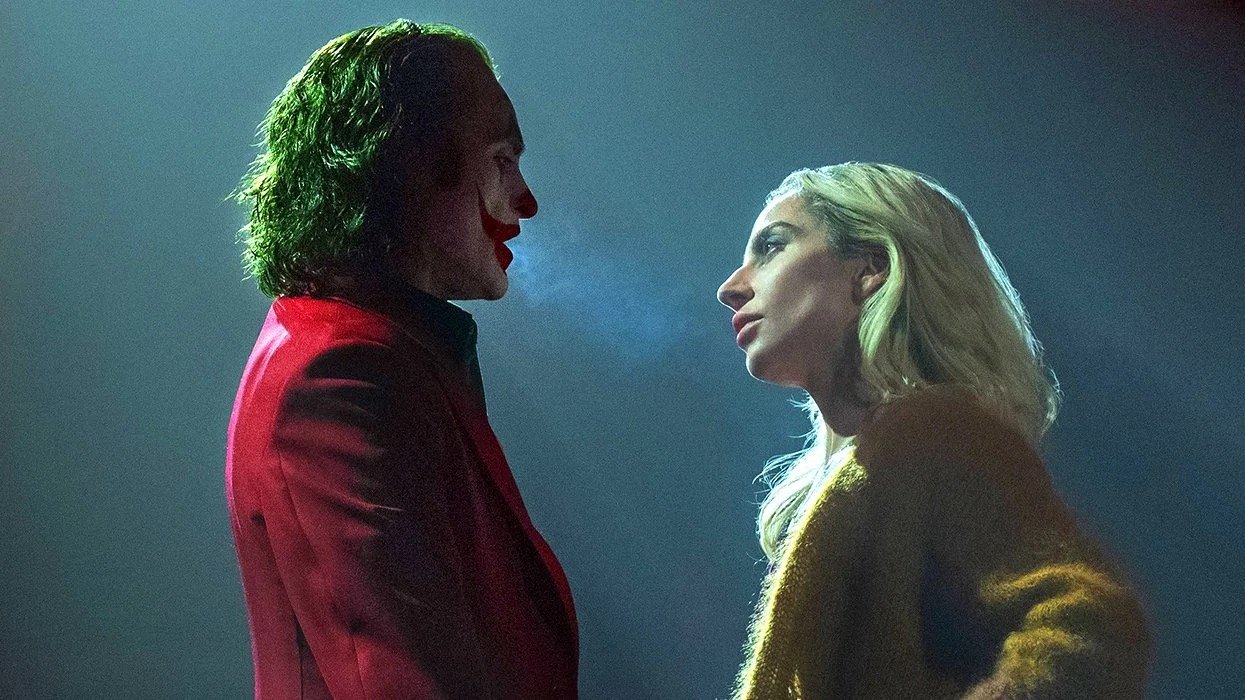JOKER: FOLIE À DEUX
*****
Directed by Todd Phillips.
Starring Joaquin Phoenix, Lady Gaga, Brendan Gleeson, Catherine Keener, Steve Coogan, Zazi Beetz, Harry Lawtey
Thriller/Horror/Musical, US, Certificate 15, 138 mins
In cinemas now from Warner Bros.
“Folie à deux”. A madness shared by two. A term sometimes applied to serial killers who commit their crimes in pairs, including The Hillside Stranglers. A memorable, Vince Gilligan-scripted episode of THE X FILES about a possibly imagined monster in a call centre. And the apt subtitle of the second JOKER movie – which, within a day or so of release seemed to inspire a larger sense of hysteria. Roundly mocked and lambasted on “soshul meeja” as an embarrassment and an insult to its well-liked 2019 predecessor its damnation often seemed to weirdly pivot around how much it cost and how (relatively) little it had made at the box office in its first days on release (who cares?! Unless you funded it, of course). There are actually people out there (behind keyboards, typically) who argue it’s one of the worst films ever made.
In an era where many Hollywood sequels appear to have been made by A.I. and/or accountants – thanks for nothing, TWISTERS, QUANTUMANIA, THE NUN 2, EXORCIST: BELIEVER – this is a rare beast. It’s a bold, deliberately paced, thought-provoking follow-up that doesn’t conform to expectation. It’s low on action and visual effects and, for once, has something interesting to say and do with returning characters and subverting the apparent limitations of a sequel about an iconic character whose last outing made over $1 billion. Ironically, a key line in the film is: “Let’s give the people what they want”.
Key to appreciating FOLIE À DEUX is to remember that the titles of Todd Phillips’ films refer to “JOKER” rather than “THE JOKER”. The original was a love letter to Scorsese’s most harrowing work, KING OF COMEDY, filtered through a character study of a downtrodden, unhinged victim of domestic abuse driven to extreme violence - and unwittingly becoming a hero for the disenfranchised. Joaquin Phoenix’s Arthur Fleck is closer to Frank in MANIAC, Donnie in DON’T GO IN THE HOUSE and Eric in FADE TO BLACK – all of whom are forever haunted by the actions and voices of their abusive mothers - than he is to any other incarnation of the DC villain we know as “The Joker”.
FOLIE À DEUX takes the form of a courtroom drama forcing us to confront who Arthur Fleck really is, while observing the cult of celebrity surrounding him. It questions whether a “trial of the century” media circus can truly produce a fair outcome and whether or not his alter ego – having gained legions of fans in both the fictional world of this movie and the real world that embraced JOKER – actually even exists anymore. At times, FOLIE À DEUX feels like the PSYCHO 2 that never was: imagine if Norman Bates (and, therefore, “Mother”) were put on trial as part of a script in which he doesn’t kill anyone and never even takes the identity of Mother. And then imagine it’s punctuated by extraordinarily staged musical numbers, shot by cinematographer Lawrence Sher in homage to a much-earlier, magnificent “flop”, Coppola’s ONE FROM THE HEART.
Though Hildur Guðnadóttir’s distinctive score resurrects the first film’s achingly moving theme (and impinges on the song and dance numbers here), everything else is unpredictable. It opens with a pastiche of classic Warner Bros. cartoons, a “Previously on JOKER” skit entitled “My Shadow and Me”. The dialogue refers directly to Hitchcock’s PSYCHO, and we glimpse a Gotham cinema that’s showing Roger Corman’s wonderful A BUCKET OF BLOOD (1959), another funny/sad horror story of an ostracised young man who unwittingly becomes a murderer and a celebrity – and pays the ultimate price.
Phoenix won a deserved Oscar for his first portrayal of Arthur, and his gaunt visage, bony physique and authentically damaged/vulnerable performance dominates this film too. His life at Arkham State Hospital is no different to his existence when he was (technically) “free”: the butt of bad jokes and casual cruelty courtesy of thuggish guards like Brendan Gleeson. A TV movie dramatization of his life made him even more famous, but he’s still a victim of a system that, having sent him back into the custody of his abusers as a child, failed him again as an adult due to budget cuts in the areas that matter the most. One of his fans, Lady Gaga’s Harleen Quinzel, beaten by her father as a child, provides a suitably uncomfortable sexual encounter but worships/loves his alter-ego so much that “Arthur” himself seems almost an inconvenience.
The unfolding trial to determine whether Arthur is “fit” for execution is at times emotionally wrenching: characters suffering from loss and PTSD following the events of JOKER are given a showcase to express their suffering. Leigh Gill, as a friend of Arthur’s whose life was spared in the first film, has a shattering moment on the stand. Far from jarring as some reviewers have suggested, the musical numbers and various nods to Old Hollywood (Fred Astaire, THE BAND WAGON) provide beguiling, occasionally devastating escapist counterpoints to a main story that can have only one outcome. Performed live on set, and with the rougher, imperfect edges of Phoenix’s vocals left intact, they cover eclectic territory ranging from The Bee Gees and Motown to The Carpenters.
It’s a strikingly bleak and brave major studio sequel, cannily and ironically deploying famous smile-inducing pop culture exclamations (“That’s all folks!”/“That’s entertainment!”) into the opposite of a crowd-pleasing blockbuster. The grim denouement is astonishingly “un-Hollywood” and, although the fate of FOLIE À DEUX at the box office suggests we’ll once again be stuck with formulaic, test-screening-approved sequels, it feels like a film that will only grow in stature as the years go by.
Steven West

